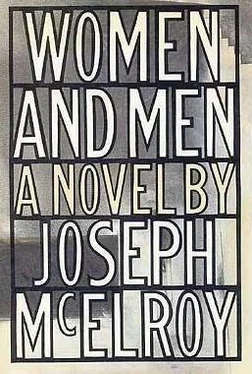And years later — not so many years later, and well before there was a Flick or an Andrew for him to retell a couple of her stories to — he’d written her a letter when she was very sick, but he’d gotten into it, recollecting the whistling they had done. He’d described all the whistling he’d done since. All the cities he’d whistled in. Across the landbridge connecting the coasts. The bathtubs and the nights, the classical records he’d whistled to, and the cabs he had heard doormen whistle for, and whistling he’d been doing at a street corner sometimes only to break off and wonder why he’d been whistling, and two beautiful girls that a group of sailors had whistled at in the rain in Tacoma. He wished he had that letter to his grandmother Margaret, their letters had crossed. She had filled her letters with news but had given the town the name she herself seemed to have inspired him to think up when he was very young, and they would look each other in the eye and he was stuck on his autobiography that everyone had to write for eighth-grade English and that she’d said not to get into a state about because it would come soon enough, and later his grandmother Margaret always referred to Windrow when she wrote to him and, with one lapse, used that name to no one else.
"Are you going to unpack?" said Joy.
"Who screwed around first?" Flick asked him one evening in New York, no longer in a mood to reflect upon an amazing grandmother she’d never known — her grazr-grandmother.
Flick was eighteen and he was probably going to South America in a couple of weeks and she was in a brief period of not being in touch with her mother in New Hampshire, though both parents wrote her every week. The waiter would probably not have been curious, but the waiter had gone away, while the father was telling the daughter that old Bob Yard the electrical contractor who had wired Flick’s Uncle Brad’s house and the town’s streetlights all the way up to the cemetery but not including the traffic intersection near the race track had never relinquished his war story of the man who died twice in the Pacific and, coming to, after death number one, correctly predicted that six American ships would be sunk by Jap suicide pilots in the battle for Leyte Gulf and that we would stop the Kamikazes only with the granddaddy of all bombs — then died again for good with a magnetic halo shining golden over his belly.
Flick said anyone could have predicted the bomb: it was just bigger.
Mayn said he never knew if Bob Yard — Bad Bob Yard — believed the story, he wasn’t the type to believe it though Mayn’s mother might have believed it; Bob was a horny old wolf, but his wife thought he was a scream and they had an understanding, which meant that once she ripped a tuft out of his head (save it going gray), but the understanding must have included her and his, his and her, absences from home, and his words (shaking his head) that they were both getting on — at which she laughed looking to Jim he thought for agreement that her husband was droll—"getting on in years, I mean," said Bob, and they both had to laugh at that, and because crazy as it or they might be they did sort of get on together.
Flick said she would have shrimp kebabs.
Her father was trivial, then? But then he got the grip of her eyes like a memory and she smiled and said it would be nice down where he was going, it was summer, she seemed to remember. And he said come to think of it her mother and he had had an understanding that worked best at a distance— which got him a laugh that was a bit off — but then out of Mayn came the unforeseen notion that over the phone the diaphragm waves retained a remainder of message units that did not get translated back into words at the receiving end but just went on. He had some of that stuff surprisingly in his head, and it made her think of how her mother had sometimes called him "Mayn," and once in a letter he’d consoled Flick for her supposedly barren imagination by telling her that the void was not just a regular void and empty but was full of all that we did not expect of ourselves — which actually surprised him, that is to find himself saying things like that.
He told the waiter they would have the grape leaves and some roe, and the waiter said, "Taramasalata," translating it into sharp, frank approval.
The waiter went away.
"Who screwed around first?"
"It was officially mutual, I don’t see how that happened," the father said; "but on the other hand, it wasn’t much. From time to time we both felt our hearts weren’t in any of that stuff. A shrink — pardon me—"
"— very funny—"
"— asked her if she’d ever cheated on me and she walked out of his office. But she came back because she wasn’t sure if it was the word ‘cheated’ or the surprise, and she knew he was better than that, he was a good man even if he used stupid words — well, square. You know. And there was cheating."
"I know."
"We were cheating ourselves."
"Oh, great. Of what?"
"I don’t know. Frankness? Because we were more afraid than silly, can you understand that?"
Flick tipped up her glass and finished it and seemed to drop it back down to the table. She made him feel he was pausing and making her wait.
"Sometimes I was afraid I’d find you all dead when I came home."
"From where?"
"Anywhere."
"Like Washington or out West?"
"Or someone’s apartment."
"I remember you called from Washington and Mom cried when she hung up."
"You know something, I always got the grip of her eyes when I phoned, it went right through me like a memory you know, it felt like a passage of time," he was saying, thinking of when he’d once felt this but hadn’t said it.
"I guess you were very married. She told me you were shy, but I never saw it."
"One part of your mother and me was very conventional, O.K.?"
"But this screwing around went on. And I don’t even want to hear about it."
"You want a one-word description of it all?"
"Like Eisenhower," she remembered.
"Very good!"
"Maybe I can think of a two-…"
"Funny, it was more an emotional screwing around, if you can understand."
"I don’t see what you mean."
"Long talks. With the other person. Agonized, inconclusive. Helpful."
"Sounds O.K. Sounds weird."
"It was close. While on the other side, we had a high resistance, went at it tooth and nail, on foot and by word of mouth — I mean the marriage went on."
"Why didn’t you end it?"
"We did," he said, and saw that she felt his stupid pain in her unsaid charge Not soon enough —she always acted like she knew what was what— and her pain was for having wanted him to think those words, go on thinking them, yet his and maybe Joy’s was to have covered up the signs over the years, the warning signs, so the children were more surprised than they needed to be when the time came. Andrew had said he had thought it had happened because his parents stayed up all night arguing. This was what he had said to Flick and Flick had started to cry when she told her mother.
Flick said, "We’re all going to have a good life, Dad."
"Whew!" she said with her breath.
Mayn’s cheek came up hard; did he look skeptical, smiling?
A Greek place up in the German neighborhood and they’d only had a glass each, but he relaxed his cheeks and managed to say, "See what the booze brings out," guessing she saw what was in his eyes, though then he suddenly thought of how good the crusty sliced loaf of bread looked in its napkin.
"It’s not booze," she said, "it’s wine, it’s golden wine."
He wondered if she liked the government agency job he’d gotten her in Washington? Or helped her get. She didn’t want to go on with college and she’d been gallivanting around the country in some kid’s car and they’d crossed the Mississippi four times on the way west, camping bright-eyed under a dark curve of continental sky. He didn’t bat an eyelash when she asked him who Mayga was because Joy had told her she was a woman in his life and her death had looked like murder. He said, "How did she ever hear of Mayga? She was just a colleague." But Flick thought he was wiped out.
Читать дальше












